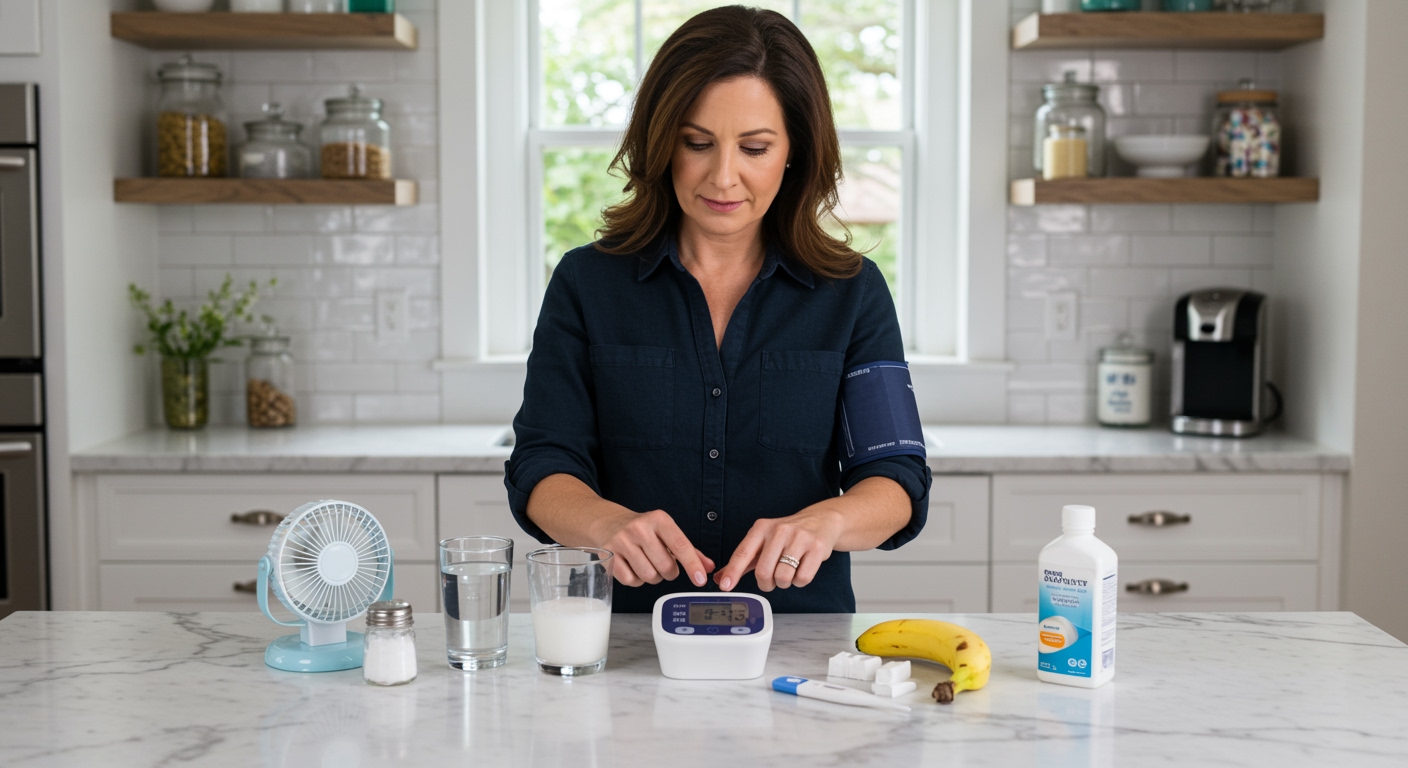✪ Key Takeaway: Hot weather worsens low blood pressure by causing blood vessel dilation and increased fluid loss through sweating.
Introduction
Summer heat waves send millions of people to emergency rooms every year with dangerous blood pressure drops.
You might be wondering why your dizziness and fatigue get worse during hot weather, especially if you already struggle with low blood pressure.
Hi, I’m Abdur, your nutrition coach and today I’m going to explain exactly how hot weather affects your blood pressure and what you can do to protect yourself.
Why Does Heat Lower Blood Pressure?
Your body has a built-in cooling system that works against you when you have low blood pressure.
When temperatures rise, your blood vessels automatically dilate to release heat through your skin.
This dilation creates more space for your blood to flow, which naturally reduces pressure throughout your circulatory system.
Your heart tries to compensate by pumping faster, but this mechanism often fails when you already have hypotension.
Meanwhile, sweating causes you to lose both water and essential electrolytes like sodium and potassium.
This fluid loss reduces your blood volume, making it even harder for your cardiovascular system to maintain adequate pressure.
✪ Fact: Blood pressure can drop 10-15 mmHg during extreme heat exposure in people with existing hypotension.
What Symptoms Get Worse in Hot Weather?
Hot weather amplifies every uncomfortable symptom you experience with low blood pressure.
Dizziness becomes more severe because your brain receives less oxygen-rich blood when pressure drops further.
You might notice increased fatigue and weakness as your muscles struggle to get adequate blood flow.
Fainting episodes become more likely, especially when you stand up quickly or spend time in direct sunlight.
Many people experience worse nausea and headaches during heat waves because their cardiovascular system works overtime.
Your concentration and mental clarity may also suffer as blood flow to your brain decreases.
✪ Pro Tip: Keep a symptom diary during summer months to identify your personal heat-related triggers.
Who Is Most At Risk During Heat Waves?
Certain groups face dramatically higher risks when hot weather meets low blood pressure.
Elderly adults have less efficient temperature regulation and often take medications that worsen heat sensitivity.
People taking diuretics or blood pressure medications face double jeopardy as these drugs enhance heat-related pressure drops.
Those with diabetes or heart conditions have compromised circulation that makes heat adaptation more difficult.
Pregnant women experience natural blood pressure changes that hot weather can make dangerous.
Athletes and outdoor workers who lose large amounts of fluid through sweating also face increased risks.
Anyone with a history of heat-related illness should take extra precautions during summer months.
✪ Note: Always consult your doctor about medication adjustments before summer heat arrives.
How Can You Protect Yourself From Heat-Related Drops?
Smart prevention strategies can keep you safe when temperatures soar.
Start your day by drinking 16-20 ounces of water before you even feel thirsty.
Choose foods with natural electrolytes like bananas, yogurt, and leafy greens to replace what you lose through sweating.
Stay indoors during peak heat hours between 10 AM and 4 PM when UV rays are strongest.
Wear loose, light-colored clothing that allows air circulation and reflects heat away from your body.
Take cool showers or use damp towels on your neck and wrists to lower your core temperature naturally.
Monitor your blood pressure more frequently during heat waves to catch dangerous drops early.
✪ Pro Tip: Keep electrolyte solutions in your refrigerator for quick access during heat emergencies.
When Should You Seek Emergency Help?
Recognizing dangerous warning signs could save your life during extreme heat.
Call 911 immediately if you experience chest pain or difficulty breathing during hot weather.
Confusion or changes in mental status signal that your brain is not getting enough blood flow.
Persistent vomiting prevents you from replacing lost fluids and can lead to dangerous dehydration.
If you faint or feel like you might lose consciousness, get medical help immediately.
Rapid heart rate combined with weak pulse indicates your cardiovascular system is failing to cope with heat stress.
Never ignore severe symptoms or try to tough it out when your safety is at risk.
✪ Note: Emergency rooms see a 30% increase in heat-related visits when temperatures exceed 90°F for consecutive days.
The Bottom Line
Hot weather definitely makes low blood pressure symptoms worse by causing blood vessel dilation and increased fluid loss through sweating.
Prevention beats treatment every time, especially when your health is on the line during summer heat waves.
I would love to hear about your experiences with hot weather and blood pressure in the comments below, so please share your questions or feedback.
References
At NutritionCrown, we use quality and credible sources to ensure our content is accurate and trustworthy. Below are the sources referenced in creating this article:
- Healthline: Health Risks Hot Days
- Manhattan Cardiology: Does Summer Heat Affect Blood Pressure
- UK Health Security Agency: Why Some People Suffer During Heatwaves
- Mayo Clinic: Heat Exhaustion Symptoms Causes





